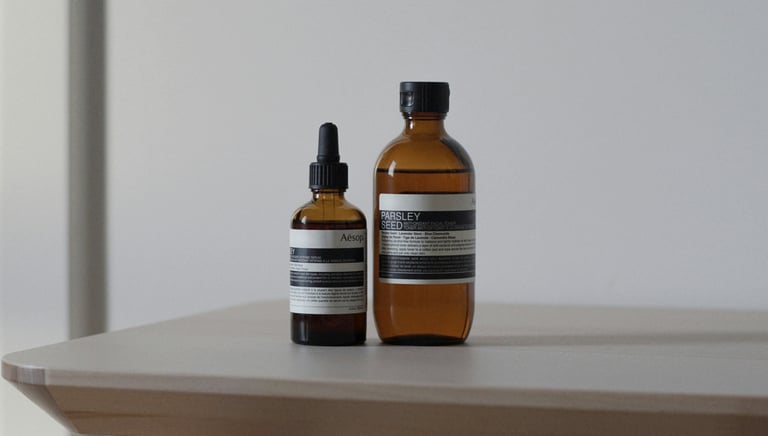Aesop: Minimalist Luxury Meets Functional Skincare
Sophia, The LuxEco Edit
10/8/20253 min read


Few beauty brands have managed to combine design, philosophy, and sustainability with the precision of Aesop. Founded in Melbourne in 1987, the brand began with a modest line of botanical formulations for hairstylists and has since evolved into one of the most influential names in modern skincare. What distinguishes Aesop is not only its minimalist aesthetic, but also its insistence that luxury can coexist with restraint, responsibility, and intellectual clarity.
In an era where clean beauty often veers into cliché, Aesop’s approach remains deliberate — grounded in architecture, sustainability, and sensorial depth. For readers of The LuxEco Edit, Aesop offers a study in how a brand can be both timeless and progressive without succumbing to greenwashing or trend fatigue.
Philosophy: Design as a Moral Language
Aesop’s philosophy can be summarised in one word: intentionality. Every element — from its amber glass bottles to its quietly literate store interiors — reflects a belief that design is a moral act. Each choice must serve both function and aesthetic, simplicity and substance.
The brand’s retail spaces, designed in collaboration with local architects worldwide, embody sustainability through permanence. Instead of templated store rollouts, each Aesop boutique is site-specific, often using reclaimed materials, local craftsmanship, and natural ventilation. This approach resists the wasteful churn of retail renovation and creates a lasting cultural footprint.
The same philosophy extends to its formulations. Aesop favours botanical ingredients paired with safe, low-impact synthetics — a combination that ensures performance without overpromising “purity.”
Hero Ingredients Spotlight
Aesop’s formulations are evidence-based rather than trend-driven. Each product aims for balance — between botanical richness and scientific rigour.
Parsley Seed Extract: Antioxidant powerhouse used in its cult-favourite serum and facial cleanser.
Rosemary Leaf & Lavender Oil: Known for anti-inflammatory and balancing properties.
Witch Hazel: A natural astringent that refines pores without stripping skin.
Niacinamide: A vitamin B3 derivative supporting barrier repair and tone uniformity.
The Parsley Seed line, in particular, exemplifies Aesop’s ethos: powerful yet understated, high-performance yet accessible.
Sustainability in Practice
Aesop’s sustainability commitments are structural, not decorative. The brand has publicly set goals for carbon neutrality and zero waste across its operations by 2030. Progress includes:
Packaging: The signature amber glass is not just an aesthetic choice — it protects product integrity and is 97% recyclable. Refill systems are being tested in select stores to reduce single-use waste.
Ingredients: All formulations are vegan, cruelty-free, and screened for environmental impact.
Energy and Sourcing: Aesop’s offices and stores increasingly use renewable energy, and its supply chain prioritises responsible botanical cultivation.
B Corp Certification: Aesop became a Certified B Corporation in 2020, joining brands like Evolve Organic Beauty and Tata Harper in proving that luxury and accountability can coexist.
These actions are measured, not performative — consistent with the brand’s understated confidence.
The Aesop Aesthetic: Quiet Luxury in Skincare
Aesop’s visual language — minimalist typography, neutral tones, amber bottles — is now widely imitated. Yet its power lies not in appearance but in coherence. The aesthetic reinforces the brand’s worldview: beauty as calm precision.
This “quiet luxury” approach mirrors the movement explored on The LuxEco Edit’s Quiet Luxury in Beauty feature, where refinement replaces excess. Aesop exemplifies how design minimalism can become a sustainability statement — fewer distractions, longer life cycles, deeper resonance.
Its stores are designed as urban sanctuaries: places of sensory retreat. The subtle scent of botanicals, the tactility of stone basins, and the subdued lighting all evoke mindfulness — a counterpoint to the overstimulation of mainstream retail.
Industry Influence and Ownership
In 2023, Aesop was acquired by L’Oréal for $2.5 billion, marking one of the largest deals in beauty history. The move raised questions: would Aesop’s integrity survive corporate ownership?
So far, signs are cautiously positive. L’Oréal has pledged to maintain Aesop’s creative autonomy and sustainability goals — aligning with its own investment in circular packaging and decarbonisation funds, as explored in The LuxEco Edit’s L’Oréal and the Economics of Change post.
This partnership, if managed well, could make Aesop’s model of ethical luxury scalable on a global level — a potential blueprint for how conglomerates can preserve craft and conscience simultaneously.
Editorial Insight: Substance Over Noise
Aesop’s enduring success lies in what it refuses to do. It avoids influencer marketing, abstains from seasonal hype, and resists the dilution that comes with endless product drops. Its power is in discipline.
In many ways, Aesop’s story is about the luxury of self-control — an aesthetic and ethical minimalism that speaks louder than any campaign. Where other brands use sustainability as a slogan, Aesop builds it into architecture, materials, and mindset.
For The LuxEco Edit, the brand epitomises what the future of beauty could look like: a space where intelligence, restraint, and sustainability replace noise, novelty, and waste.
Aesop invites consumers to slow down — to consider what they apply to their skin and what that choice signifies. Every amber bottle embodies more than a product; it’s a gesture toward thoughtful living.
